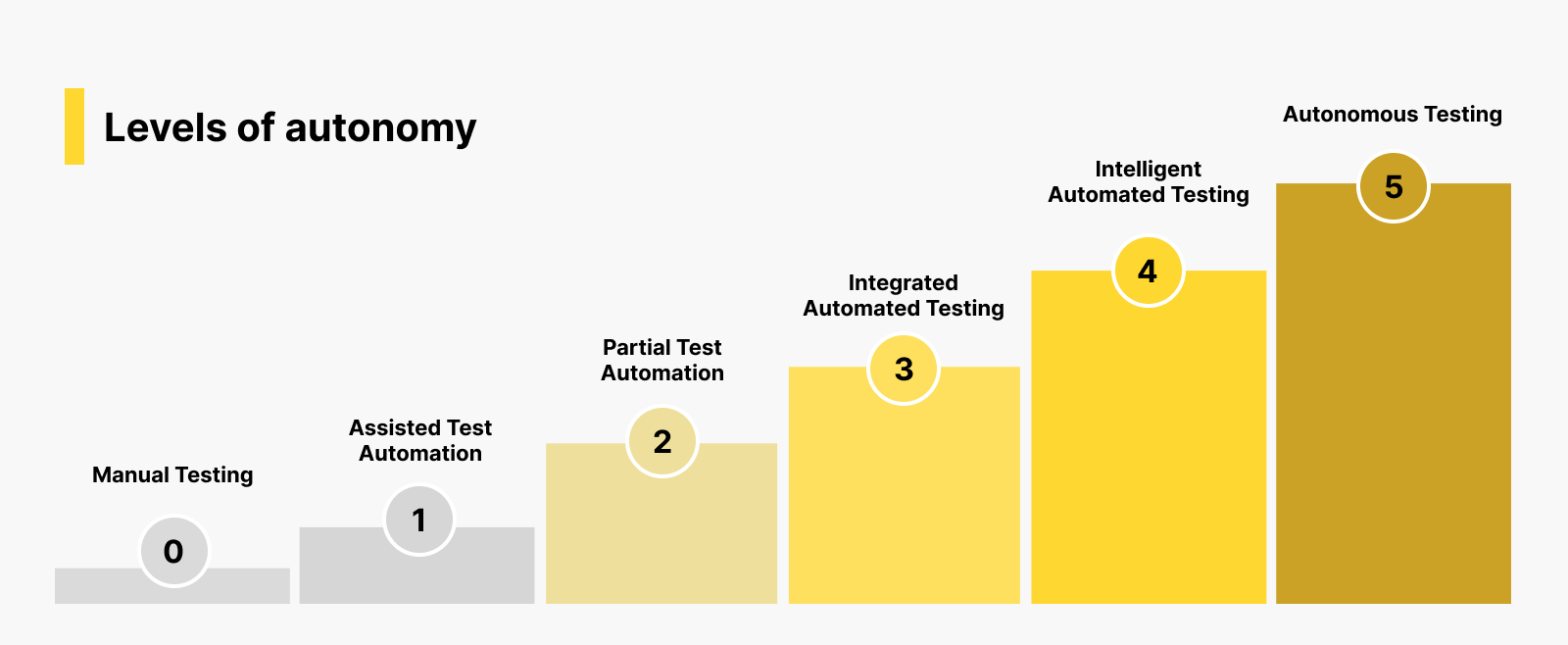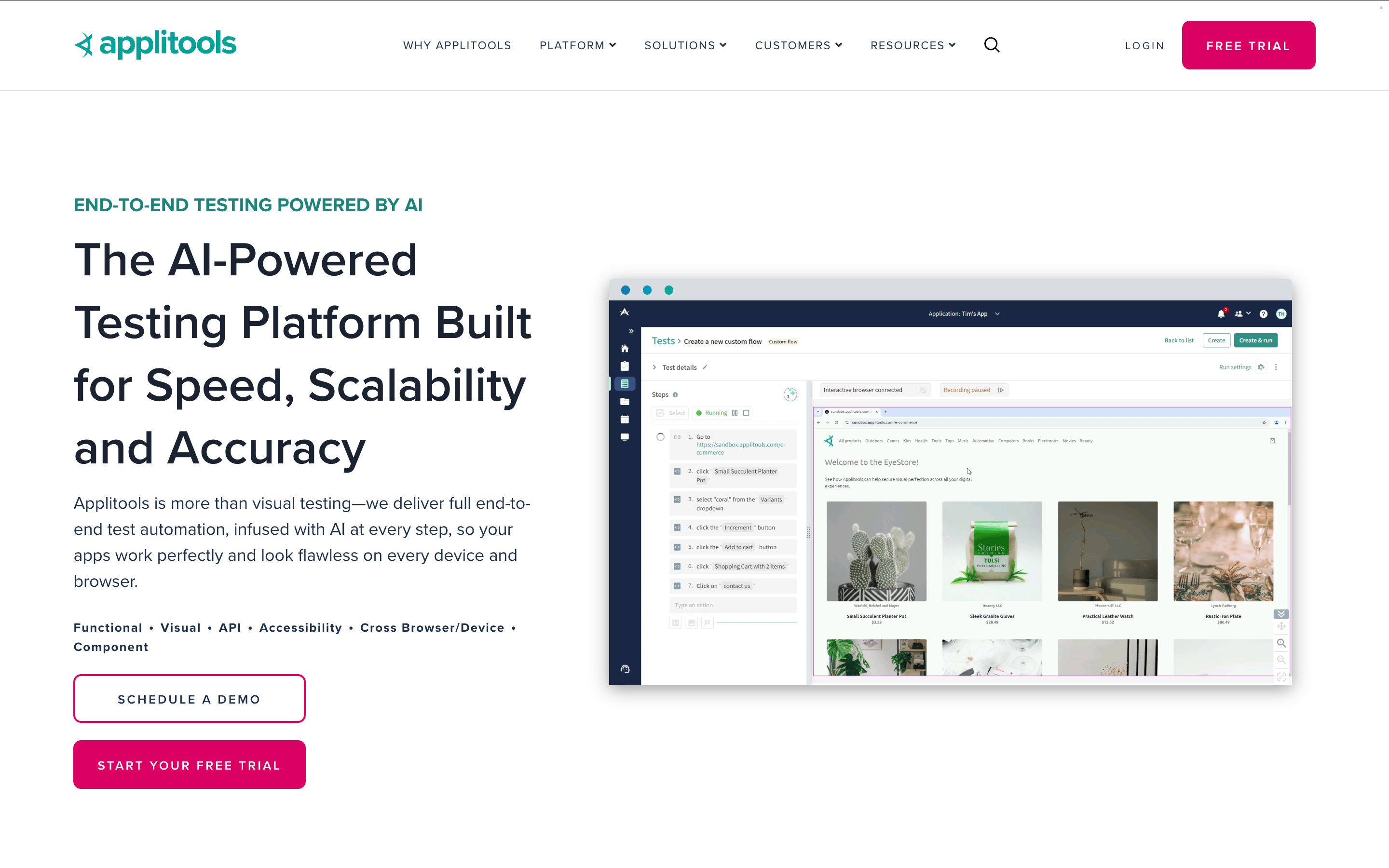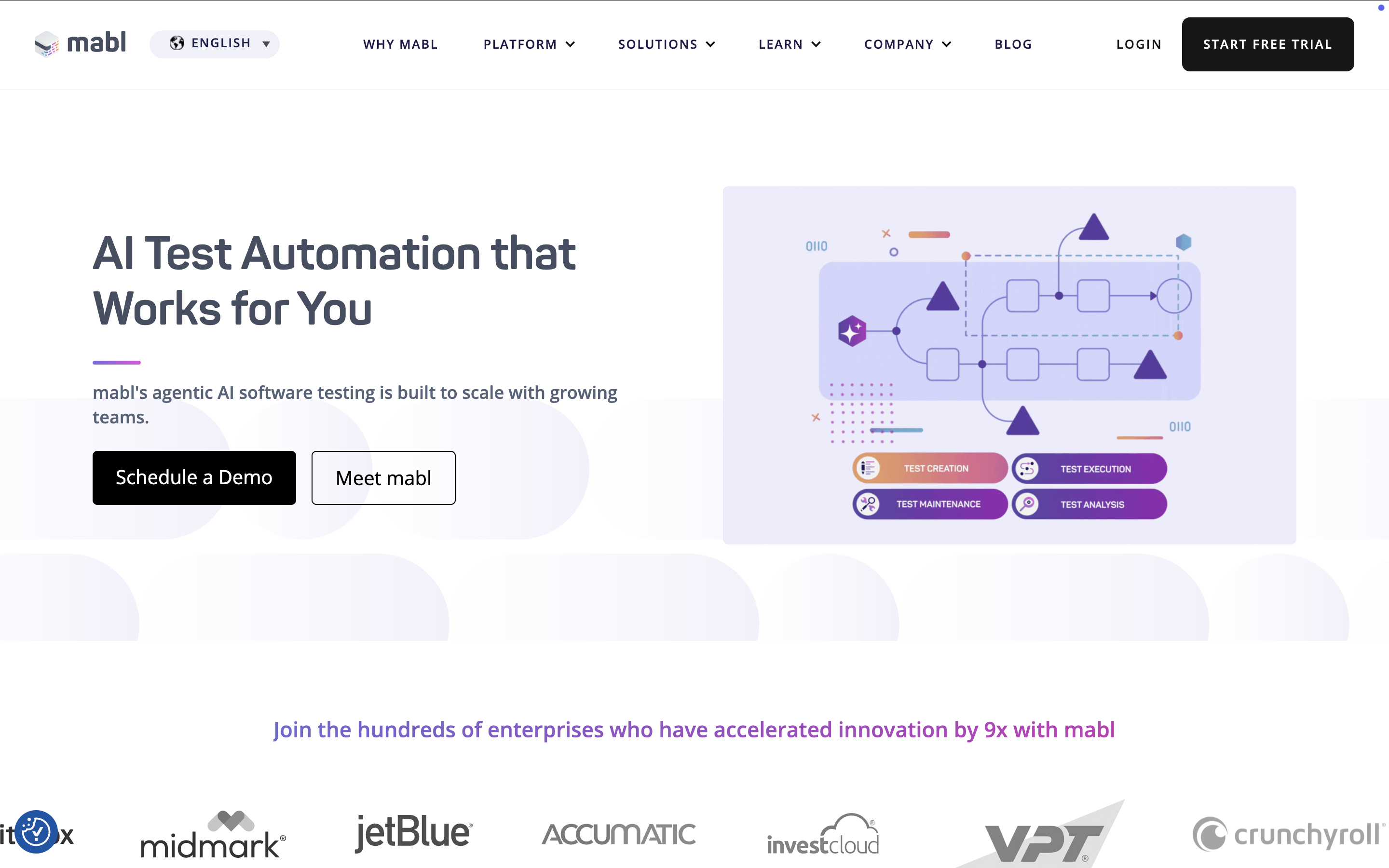7 Best AI Testing Tools for Smarter Test Automation (2026)
Learn with AI
AI has reshaped almost every industry, and software testing is no exception. After extensive research, we compiled the top 7 AI testing tools that can elevate your testing workflow.
These AI-powered testing tools include:
- Katalon
- TestCraft
- Applitools
- Functionize
- Mabl
- AccelQ
- Testim
What are AI-based testing tools?
AI testing tools leverage artificial intelligence to enhance the software testing process. They support QA teams in traditional tasks like test creation, management, and reporting, while also performing advanced cognitive functions that previously required human intelligence.
These tools represent a major leap forward in the testing landscape, bringing organizations closer to level 5 of the Autonomous Testing Benchmark.

📚 Read More: Autonomous Testing: A Complete Guide
The role of AI in test automation
Artificial intelligence is the simulation of human intelligence through machines. While traditional programs follow predefined instructions, AI models are trained on massive datasets, enabling them to recognize patterns, make decisions, learn, and improve over time.
This adaptability makes AI a game-changing force in test automation, empowering QA teams to perform more advanced testing activities with higher accuracy and efficiency.
According to the State of Software Quality Report 2024, test case generation is the most common AI application in both manual and automated testing, followed closely by test data generation.

Key features of AI testing tools
With AI-enabled test techniques, teams can enhance every phase of the Software Testing Life Cycle (STLC).
1. Test script generation
Creating test scripts traditionally required deep system knowledge and significant manual effort. AI now accelerates this process by:
- Analyzing requirements, historical test cases, and application behavior to suggest optimized scripts
- Providing ready-made templates with useful code snippets and comments
- Turning natural-language instructions into complete test scripts
2. Test Data Generation
High-quality testing requires large volumes of realistic data. AI improves this by:
- Generating synthetic data modeled on real datasets
- Transforming existing data to increase scenario coverage
- Enhancing the accuracy and relevance of test data
- Scanning large codebases to understand context and data relationships
3. Intelligent Test Execution
Executing tests across browsers and devices can be slow and repetitive. AI helps by:
- Organizing and prioritizing test cases
- Selecting appropriate tests based on browser, OS, or environment
- Choosing which tests to rerun when updates or fixes occur
4. Smarter Test Maintenance
Keeping tests up to date as applications evolve is time-consuming. AI simplifies this by:
- Automatically finding replacements for broken locators (self-healing tests)
- Mapping UI changes to underlying code to highlight which tests require updates
5. Root Cause Analysis
AI helps teams diagnose failures faster by:
- Reviewing logs, performance data, and error patterns
- Tracing failures back to specific features or requirements
- Leveraging past failures to inform new troubleshooting
📚 Read More: The Potential of AI in Regression Testing
Benefits of AI testing tools
AI testing tools offer several advantages:
- Acting as intelligent assistants for decision-making and analysis
- Accelerating testing workflows, especially test case and script generation which enables faster releases
- Improving test coverage with instant, customized test data generation
- Adapting more effectively to code changes
Top 7 AI testing tools you should know
The AI testing tools below are leading the industry, integrating AI deeply into their testing workflows.
1. Katalon

Katalon is a full quality management platform supporting test creation, management, execution, maintenance, and reporting across web, API, desktop, and mobile environments. It includes several AI-powered capabilities such as:
- TrueTest™: Captures real user interactions, builds user-journey models, auto-generates tests and test data, and measures journey coverage.
- StudioAssist: Converts plain-language instructions into code and explains existing code for clarity across stakeholders.
- SmartWait: Pauses execution until required UI elements appear, reducing false positives.
- Self-healing: Automatically repairs broken locators for future test runs.
- Visual testing: Uses AI to detect meaningful UI layout and text changes.
- Test flakiness analysis: Uses execution history to quantify and monitor test reliability.
- Image locator: Identifies elements based on appearance instead of DOM attributes.
- Web service anomaly detection: Flags APIs with abnormal performance trends.
Katalon continues to expand its AI offerings to help QA teams achieve higher accuracy, speed, and consistency.
Visit Katalon Website | Pricing | G2 Reviews
2. TestCraft

TestCraft by Perfecto is an AI-powered Selenium-based automation tool used for both manual and automated testing, delivering rapid test creation for web applications.

Key features:
- Drag-and-drop UI for building automated tests quickly
- Parallel execution across browsers and environments with minimal coding
- On-the-Fly mode that auto-generates reusable test models
- ML-driven element detection that adapts to UI changes
Visit TestCraft Website | G2 Reviews
3. Applitools

Applitools is an AI-powered visual testing platform widely used by engineering and digital transformation teams. It excels in fast, accurate visual validation using AI and ML.

Key features:
- Effectively identifies visual bugs such as overlapping elements, invisible components, off-page UI, and unexpected visual changes.
- Provides strong visual test analytics and reporting.
- Uses Applitools Eyes to accurately detect meaningful visual differences while ignoring irrelevant noise.
Check out G2’s feature comparison between Katalon and Applitools, based on real user reviews from the world’s largest tech review site.
Visit Applitools Website | G2 Reviews
Pricing: Applitools offers three tiers: Starter, Eye, and Ultrafast Test Cloud.
4. Functionize

Functionize is a cloud-based platform for functional, performance, and load testing. Its AI/ML engine accelerates test creation, diagnostics, and ongoing maintenance.

Key features:
- AI and NLP-driven test automation
- Analytics and reporting for monitoring functionality and results
- Self-healing capabilities
- Test planning and editing tools
- Support for multiple desktop and mobile browsers
Visit Functionize Website | G2 Reviews
5. Mabl

Mabl is a low-code AI testing platform with a clean GUI designed for fast, end-to-end test creation. It supports continuous testing throughout the SDLC and promotes collaboration across teams.

Key features:
- Low-code test creation
- Intelligent automation with self-healing
- Data-driven testing for realistic scenarios
- End-to-end coverage including APIs
- Developer insights and diagnostics
- User-friendly dashboard
Visit Mabl Website | G2 Reviews
6. AccelQ

Accelq automates test design, planning, and execution for UI, API, mobile, and desktop applications, offering a unified view of the QA lifecycle.

Key features:
- Automated test generation
- Intuitive dashboard
- Predictive analytics and lifecycle management
- Full API and end-to-end testing support
Visit ACCELQ Website | G2 Reviews
7. Testim

Testim Automate uses machine learning to solve slow test creation and heavy maintenance. Non-technical users can create tests with its recorder, while engineers can extend them with code.

Testim enhances test maintenance with its smart locator system. It evaluates every UI element involved in a test and assigns weighted scores to hundreds of attributes. This means that even if a single attribute — such as an element ID — changes, Testim can still identify the correct element and prevent unnecessary failures. The process is fully automated and avoids the complexity and fragility of manual selector queries.
|
FAQs on AI-powered Testing Tools
What are AI-powered testing tools?
AI-powered testing tools are software solutions that leverage artificial intelligence systems to enhance and automate various aspects of the software testing process, including test creation, management, and reporting.
How does AI contribute to test automation?
AI simulates human intelligence, allowing machines to learn, adapt, and recognize patterns from data. In test automation, AI is used for advanced tasks like generating test cases and test data, improving test execution efficiency, and enabling smarter test maintenance.
What are the main features of AI-augmented testing tools?
Key features include automated test script generation from requirements or plain language, synthetic and varied test data generation, intelligent test execution that prioritizes and adapts tests, smarter test maintenance with self-healing mechanisms, and AI-driven root cause analysis for failures.
What benefits do AI testing tools offer to QA teams?
AI testing tools accelerate testing processes, shorten release cycles, improve test coverage with customized data, minimize redundant testing and failures, and act as an intelligent assistant for decision-making and analysis.

-2.png?width=1600&height=420&name=banner9%20(6)-2.png)
.png?width=1600&height=420&name=banner9%20(7).png)